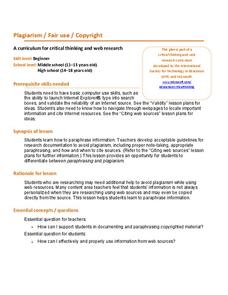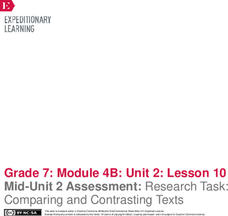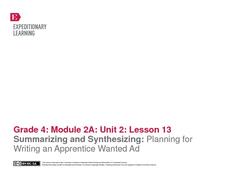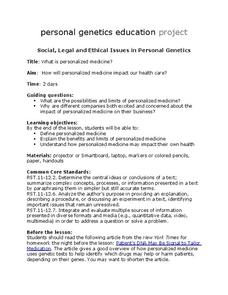EngageNY
Listening Closely and Taking Notes: Colonial Trade Podcast About the Wheelwright
Voices from the past. Young scholars listen to a podcast interview with a historical re-enactor as they continue their research in the eleventh instructional activity of this unit on colonial trade. Applying their close reading skills,...
EngageNY
Listening Closely and Taking Notes in Expert Groups: Colonial Trade Podcast
The twelfth instructional activity of this unit builds on the skills developed in the previous instructional activity, as fourth graders continue their quest to become experts on colonial trade by listening to interviews with historical...
Curated OER
Plagiarism Workshop
What do George Harrison, Vanilla Ice, and Steven Ambrose all have in common? The Warner Brothers’ films Batman Forever and The Devil’s Advocate? All are guilty of plagiarism. And if you are considering a research project and want to...
Curated OER
Note-Taking: K.I.S.S. "Keep It Short and Simple"
Note-taking is an essential study skill, and it needs to be taught! In the context of a research project on energy sources, learners find multiple sources, evaluating, paraphrasing, and citing them correctly. Two lists with note-taking...
Microsoft
Plagiarism Fair Use Copyright
Nothing makes junior high and high school teachers more frustrated than plagiarism. Instruct young writers about copyright laws and the correct ways to paragraph information without copying the exact words. A set of secondary-level...
EngageNY
Structuring The Search: Categorizing Our Research
What can you contribute? Scholars read text to determine how ants contribute to the rainforest. First, they categorize and sort facts gathered from reading. Next, readers focus on specific terms in each paragraphs of the text Ants by...
EngageNY
Gathering Information about Screen Time: Assessing and Reading Internet Sources, Day 2
Calling all researchers! Using the resource, scholars continue conducting independent Internet research about a chosen research question. As they browse the web in search of articles to answer their questions, pupils paraphrase their...
EngageNY
End of Unit Assessment, Part 1: Research and Response
Stay on target. The class reviews the learning targets for the unit and the end of unit assessment. Scholars then begin working on part one of the assessment answering how Canada's natural resources meet the needs of the people and how...
Eau Claire Area School District
Intellectual Property Lesson Plans
Fair use, intellectual property, public domain ... what does it all mean? Scholars act as judges to determine if different scenarios constitute fair use. They also advance their research skills by practicing paraphrasing and citing...
EngageNY
Researching Digital Sources, Part 2: Guided WebQuest
Go surfing for the facts. Scholars continue their work using their Digital Resources on DDT sheet to find information by searching websites. After collecting information, they mix and mingle to hear information discovered by classmates.
EngageNY
End of Unit 3 Assessment: Writing a Research Synthesis
Ready, set, write! Scholars work on the end-of-unit assessment by completing a writing prompt. They then look at the model performance task from instructional activity two to create a rubric for scoring the exercise. Using turn and talk,...
EngageNY
Using Effective Search Terms: Researching Screen Time
The proof is in the reading. Scholars read an article, "Attached to Technology and Paying the Price," and answer text-dependent questions. Next, they complete a Venn diagram to contrast two authors' use of evidence on the topic of screen...
EngageNY
Mid-Unit Assessment, Part II: Research Task: Comparing and Contrasting Texts
When it comes to comparing texts, it's apples to oranges. As part two of the mid-unit assessment, learners compare and contrast two texts about the Internet and brain health. While reading, scholars use a Venn diagram to compare two...
EngageNY
Mid-Unit 2 Assessment: Research Task: Comparing and Contrasting Texts
It's the half-way mark! Pupils demonstrate understanding of unit standards by completing a mid-unit assessment. After reading an informational article about water management strategies, scholars complete a graphic organizer to identify...
California Department of Education
Plagiarism is Stealing!
Stop, thief! Do your pupils understand the consequences of plagiarism? Lesson three of six in a series of college and career readiness activities demonstrates the dangers of taking credit for someone else's work. Learners engage in...
K20 LEARN
To Ban or Not to Ban? Intellectual Rights and Responsibilities: Banned Books, Censorship Part 2
After examining different perspectives on book banning, scholars select a book from a list of frequently banned books and research the controversies surrounding it. They then craft an argument about their chosen book, including arguments...
EngageNY
Taking Notes and Citing Quotes from Text: Gathering Information on our Rainforest Insects
In other words. Scholars practice using paraphrasing and quotes. They partner in pairs to write a paraphrase for an information text strip. Individuals then use their skills to paraphrase information from the text Fire Ants.
EngageNY
Mid-Unit 3 Assessment and Independent Reading Check
It's time for scholars to be on their own. Individuals work independently reviewing sources to answer their research questions. Learners read "Are Your Clothes Made in Sweatshops?" to help complete the mid-unit assessment. After...
Overcoming Obstacles
Writing Reports
Following a review of how to research and take notes, scholars define the term paraphrase and identify ways to organize information and finish reports. To put their newfound knowledge to the test, learners interview a peer, take notes,...
EngageNY
Mid-Unit Assessment and Independent Reading Check-In
Your turn! Seventh graders work independently to complete the mid-unit assessment. They first read Images in Men in Advertising then answer questions referring to the text. When they finish the assessment, pupils read on their own.
EngageNY
Summarizing and Synthesizing: Planning for Writing an Apprentice Wanted Ad
In instructional activity 13 of this unit on colonial trade, young researchers learn about apprentices as they prepare to write help-wanted ads for the specific trade they have been researching. To begin, the class listens closely as the...
Personal Genetics Education Project
Personalized Medicine
Genetics learners read an article and watch a video about personalized medicine and the hope it holds for treating patients more specifically than doctors currently are able to. They research, design, and produce a brochure about the...
EngageNY
End of Unit 2 Assessment: Working with Two Texts - Reading, Listening, Summarizing, and Synthesizing
As a summative assessment for this unit on colonial trade, fourth graders listen to and read informational texts in order to demonstrate their ability to take notes, write summaries, and draw connections. Young scholars first listen as...
EngageNY
Mid-Unit Assessment: On-Demand Note-Taking, Analysis, and Reflection: “Should We Drill?”
Pupils take a mid-unit assessment, completing a point of view graphic organizer based on an informational article about offshore drilling. Next, learners answer text-dependent and short-answer questions about the text.

























